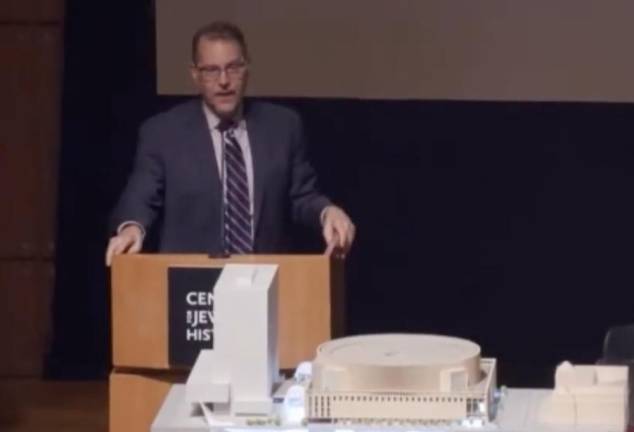Boro Pres Says End MSG’s $1B Tax Break But Pay Jim Dolan for Property to Fix Penn Station
Borough president Mark Levine told Community Board 5 that he would reluctantly pay Jim Dolan’s MSG for the parts of the Garden-owned property that would have to be torn down or replaced to fix Penn Station. At the same time, he is calling for an end to the property tax exemption the Garden has enjoyed for decades which is estimated to have saved it over $1 billion since its inception. Many community activists still want Penn Station to be moved.
Madison Square Garden has paid no property taxes on its arena since 1982, a largesse from government easily worth $50 million a year now or over $1 billion since its inception. At the same time, the MTA wants The Garden to give up some slices of that property for a renovation of Penn Station below, something the Garden says it should not be forced to do without compensation. In the complicated conversation about the future of Penn Station these two thoughts had traveled on, shall we say, separate tracks. Until now.
Both questions were delivered this week to The City Council. In the ways of government, which can be more convoluted than the corridors of the current Penn station, neither the property tax exemption nor the proposed property takeover are the actual question the Council must answer this summer. Yet both are clearly on the table as the council considers whether, or for how long, to extend the Garden’s permission to operates its 20,000 seat arena.
The number of venues in New York which require such special permission can be counted on one hand—Yankee Stadium, Citi Field, Barclays Center and the Garden. None of the others sit atop the busiest, and most dismal, train station in the western hemisphere. The City Planning Commission recommended to the Council on July 12 that the Garden be allowed to stay for another ten years, but that it had to promise to cooperate with a renovation of the station and run the plans by the city when they are 30 percent ready. In other words, linking the permit to operate the arena to cooperating with the renovation of the station. Which is where the property takeover comes in. Considerable momentum has built to renovate Penn station. Governor Hochul keeps holding press conferences to dramatize her commitment to a better station. There are competing plans for this by the MTA and from a private developer, ASTM. But both would use property now owned by The Garden, which bought the property from the street level up from the floundering Pennsylvania Railroad in the 1960’s. Amtrak owns the station from the street level down and is working jointly with the MTA and NJ Transit on renovation plans. One significant difference between the ASTM and MTA proposals is that ASTM would pay the Garden for the property it wants to use while the MTA believes the Garden should turnover the property without charge on the grounds that it benefits enormously from its presence above the station. The Garden has not been subtle about its preference for the ASTM approach, which has the political drawback of looking like a largesse to James Dolan, the unpopular chief executive of the dual companies that own both the Garden and the two sports franchises that play there, the Knicks and the Rangers.
“I don’t like the idea of putting money into the pocket of MSG,” acknowledged Mark Levine, the Manhattan Borough President. But at a public meeting between ASTM and representatives of Community Board Five, Levine offered a solution that explicitly linked the renovation of Penn Station to revoking The Garden’s tax exemption:
“For better or for worse, MSG owns this property. They own the theatre. They own the taxiway, which is that little space between the office building and the arena. They own the pedestrian skyway ...We are going to need access to some or most of those assets to do this right. For better or worse, the law requires they be compensated for that. I don’t like the idea of putting more money in the pocket of MSG. I think the way to deal with that is not to block the public from getting great transit upgrades. It’s to end the tax credit which MSG is getting.” That tax credit was granted in 1982, more than a decade after The Garden opened above the station. At the time, city and state officials, or some of them at least, feared that The Knicks or The Rangers, or both, would flee town. But times have changed and now The Garden does not appear interested in moving even across the street, let alone out of town. Whether the tax exemption ever made sense, it certainly does not now, according to a report commissioned by the City Council. “The current location of MSG in Midtown Manhattan and directly above Penn Station, creates optimal conditions for revenue generation that would be impossible to replicate were MSG to move to New Jersey or another metropolitan area,” said the report from the city’s Independent Budget office. The Budget Office estimated that the tax exemption has saved the Garden nearly a billion dollars, inflation adjusted, since 1982. It is noteworthy the council asked for this report since it actually has no direct control over the tax break, which was enacted by the state legislature. The State Senate, in a bill pushed by Sen. Brian Kavanagh, proposed to repeal the exemption in its budget this year. But the Assembly and Governor did not take that up, and some legislators blamed Governor Hochul for undercutting the effort just as it was gaining steam. But the question is effectively now back in front of her. There is no official price tag for buying property from The Garden for the renovation of the station. ASTM says it would pay less than $500 million for The Theathre on Eighth Avenue, which it would demolish to build a Grand train hall and entrance. The City Council can exchange the permission for the Garden to operate for a promise to cooperate on renovations, as the planning commission recommended. But only the governor and the legislature can turn that general cooperation into the actual deal Levine floated: paying the Garden for property needed in the renovation in exchange for repealing the tax exemption."The State ultimately will determine the financing of the station renovation, and has jurisdiction over the tax exemption,” Levine told Straus News, “so this could indeed be coordinated."

